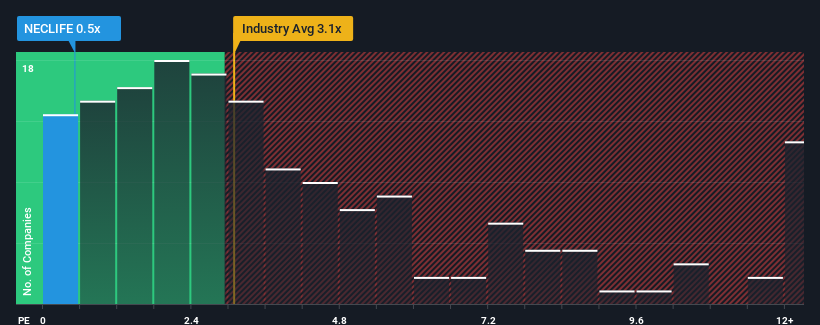Nectar Lifesciences Limited (NSE:NECLIFE) Shares Fly 31% But Investors Aren't Buying For Growth

Nectar Lifesciences Limited (NSE:NECLIFE) shares have had a really impressive month, gaining 31% after a shaky period beforehand. The last 30 days bring the annual gain to a very sharp 47%.
In spite of the firm bounce in price, Nectar Lifesciences' price-to-sales (or "P/S") ratio of 0.5x might still make it look like a strong buy right now compared to the wider Pharmaceuticals industry in India, where around half of the companies have P/S ratios above 3.1x and even P/S above 6x are quite common. However, the P/S might be quite low for a reason and it requires further investigation to determine if it's justified.
Check out our latest analysis for Nectar Lifesciences

How Has Nectar Lifesciences Performed Recently?
The revenue growth achieved at Nectar Lifesciences over the last year would be more than acceptable for most companies. Perhaps the market is expecting this acceptable revenue performance to take a dive, which has kept the P/S suppressed. If that doesn't eventuate, then existing shareholders have reason to be optimistic about the future direction of the share price.
Although there are no analyst estimates available for Nectar Lifesciences, take a look at this free data-rich visualisation to see how the company stacks up on earnings, revenue and cash flow.How Is Nectar Lifesciences' Revenue Growth Trending?
In order to justify its P/S ratio, Nectar Lifesciences would need to produce anemic growth that's substantially trailing the industry.
If we review the last year of revenue growth, the company posted a worthy increase of 8.9%. The latest three year period has also seen a 7.2% overall rise in revenue, aided somewhat by its short-term performance. Accordingly, shareholders would have probably been satisfied with the medium-term rates of revenue growth.
This is in contrast to the rest of the industry, which is expected to grow by 13% over the next year, materially higher than the company's recent medium-term annualised growth rates.
With this in consideration, it's easy to understand why Nectar Lifesciences' P/S falls short of the mark set by its industry peers. It seems most investors are expecting to see the recent limited growth rates continue into the future and are only willing to pay a reduced amount for the stock.
What Does Nectar Lifesciences' P/S Mean For Investors?
Nectar Lifesciences' recent share price jump still sees fails to bring its P/S alongside the industry median. Using the price-to-sales ratio alone to determine if you should sell your stock isn't sensible, however it can be a practical guide to the company's future prospects.
As we suspected, our examination of Nectar Lifesciences revealed its three-year revenue trends are contributing to its low P/S, given they look worse than current industry expectations. At this stage investors feel the potential for an improvement in revenue isn't great enough to justify a higher P/S ratio. If recent medium-term revenue trends continue, it's hard to see the share price experience a reversal of fortunes anytime soon.
It is also worth noting that we have found 3 warning signs for Nectar Lifesciences (2 don't sit too well with us!) that you need to take into consideration.
Of course, profitable companies with a history of great earnings growth are generally safer bets. So you may wish to see this free collection of other companies that have reasonable P/E ratios and have grown earnings strongly.
Valuation is complex, but we're here to simplify it.
Discover if Nectar Lifesciences might be undervalued or overvalued with our detailed analysis, featuring fair value estimates, potential risks, dividends, insider trades, and its financial condition.
Access Free AnalysisHave feedback on this article? Concerned about the content? Get in touch with us directly. Alternatively, email editorial-team (at) simplywallst.com.
This article by Simply Wall St is general in nature. We provide commentary based on historical data and analyst forecasts only using an unbiased methodology and our articles are not intended to be financial advice. It does not constitute a recommendation to buy or sell any stock, and does not take account of your objectives, or your financial situation. We aim to bring you long-term focused analysis driven by fundamental data. Note that our analysis may not factor in the latest price-sensitive company announcements or qualitative material. Simply Wall St has no position in any stocks mentioned.
About NSEI:NECLIFE
Nectar Lifesciences
Manufactures and sells pharmaceutical products in India and internationally.
Solid track record with adequate balance sheet.


